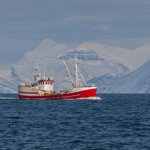2022 Ghost Gear Removal Competition reveals extent of fishing's contribution to marine plastic pollution

A ghost gear removal competition, hosted by the Azores tuna fishery, has resulted in a plastic-neutral status for the islands' pole-and-line fishery for the 2022 fishing season.
The competition picked up 735 kilograms of marine litter, with 620.65 kilograms of that total being fishing gear, according to the International Pole and Line Foundation (IPNLF). Ghost gear is fishing gear that has been abandoned, lost, or discarded at sea that entrap animals, snag on sensitive habitats, spread disease, and contribute to an invasion of alien species.
“This second year of the competition showed the dedication of Azorean tuna fishers and their important role in driving improved environmental practices at-sea and helping tackle environmental issues such as ghost fishing. The competition is creating awareness of ghost fishing issues and it’s clear that we’ve now developed a model of collecting fishing gear out at sea that can extend successfully throughout the entire tuna fleet of the Azores and can be replicated by other fleets across the globe,” Sea Observatory of the Azores (OMA) Presidente da Direcçao Carla Damaso said.
Plastic pollution is on the rise, with about 12.7 million metric tons disposed of every year, taking decades or centuries to degrade. A 2019 report by Greenpeace revealed ghost gear makes up a significant amount of the ocean pollution, with most of the large plastics lost in the ocean either fishing nets or buoys. I
The plastic pick-up competition was organized through the Plastic Neutrality Project, a joint effort from IPNLF, the Azores Fisheries Observer Program (POPA), and the Institute of Marine Research (IMAR) as well as OMA, Associação de Produtores de Atum e Similares dos Açores (APASA), Federação das Pescas dos Açores (FPA), and funded by Fish4ever and Biocoop France.
“It is essential that we support initiatives such as this competition in order to protect marine life and ocean habitats from the threats of plastic pollution," Fish4Ever Managing Director Charles Redfern said. "Through attaining plastic-neutral status for two years running, the Azores pole-and-line fishery has shown it has the lowest plastic footprint of any fishery in the world. We could do so much more in terms of positive impact and support of exemplary fisheries like this if we were able to get more traction in the marketplace where the end-products sell, and so it helps us so much to have proactive consumers and especially retailers supporting these great stories."
This Plastic Neutrality Project involves three annual ghost gear removal competitions in the Azores through 2023, with the goal for the pole-and-line fleet to become plastic neutral – removing, at the minimum, the same amount of plastic from the environment as an organization contributes to the pollution. The 2022 competition saw more vessels participating and a much larger amount of ghost gear removed. The four types of fishing gear collected and ranked by highest to lowest were: nylon cables (253.35 kilograms), buoys (134.80 kilograms), fishing reflectors (118 kilograms), and nylon multifilament nets (114.5 kilograms).
Photo courtesy of the Azores Fisheries Observer Program






Share